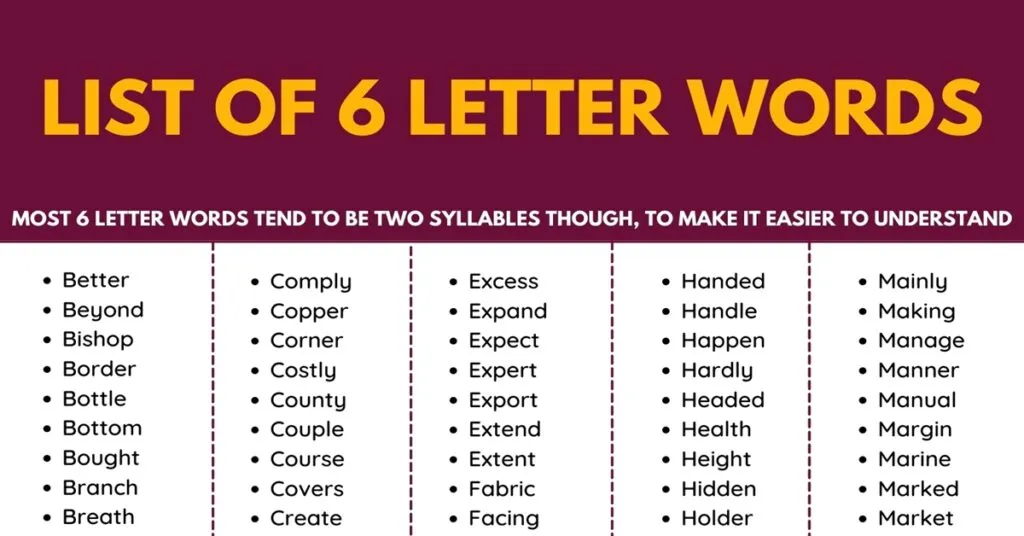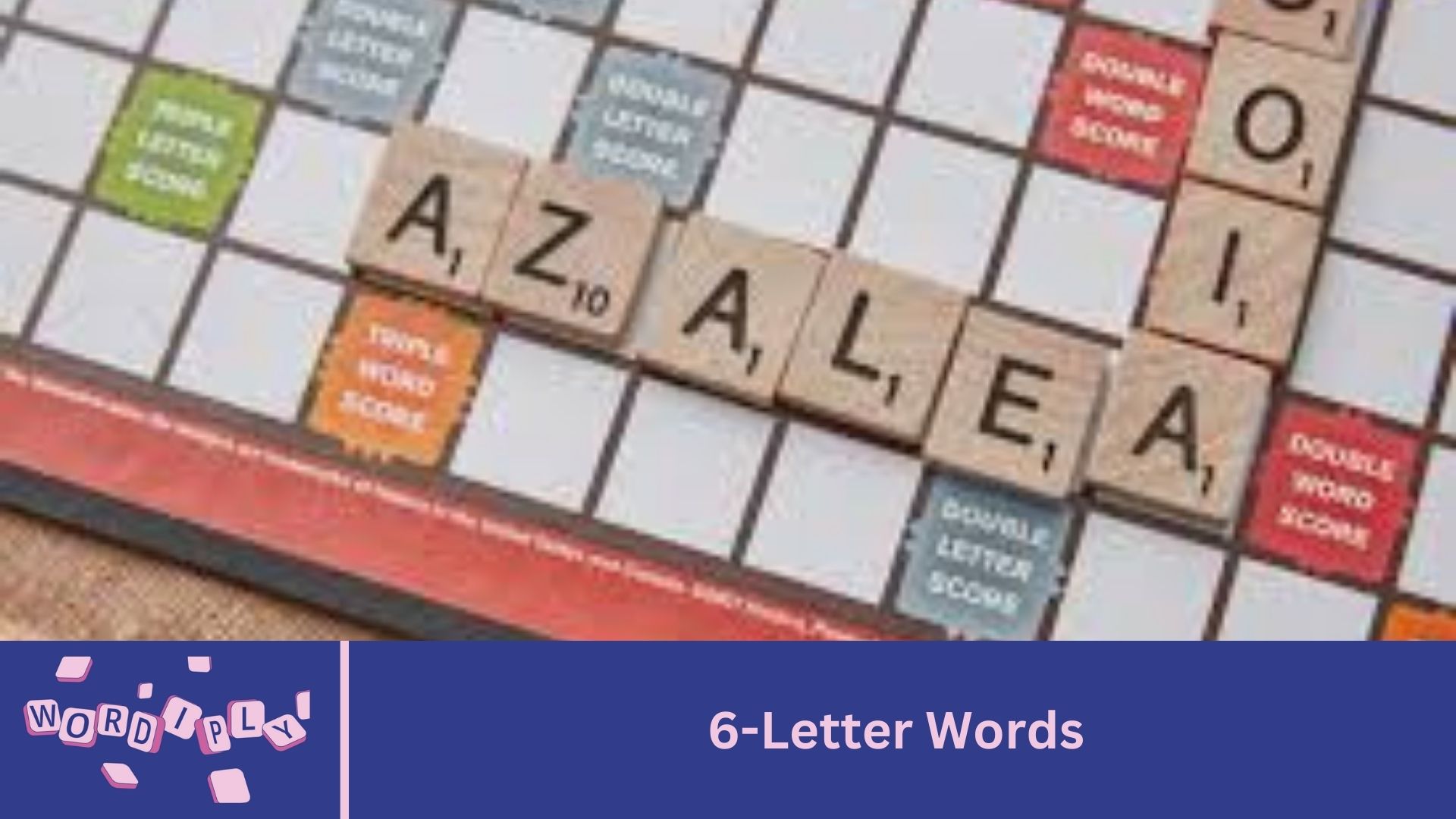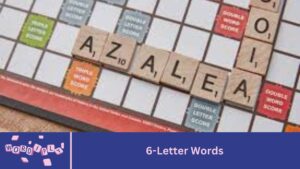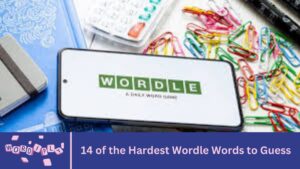In the Introduction, briefly explain the importance of 6-letter words in word games and puzzles. Highlight how they add a layer of challenge and fun, while also playing a key role in expanding vocabulary and language skills. This sets the stage for why focusing on 6-letter words can be both enjoyable and beneficial.

Why Focus on 6-Letter Words?
Focusing on 6-letter words is valuable for several reasons, particularly in the context of word games, language learning, and everyday communication. Here’s an explanation:
1. Role in Popular Word Games
- Game Significance: In games like Scrabble, Words with Friends, and certain variations of Wordle, 6-letter words can be a sweet spot. They often offer a good balance between being challenging to find and yielding high points. Mastering 6-letter words gives players a strategic advantage, allowing them to maximize their score by placing words that fit well on the game board or within the constraints of a puzzle.
- Increased Scoring Potential: Unlike shorter words, 6-letter words often cover more tiles or squares, especially on bonus spaces in games like Scrabble. This can lead to higher scoring opportunities.
2. Strategic Value in Word Games
- Word Flexibility: 6-letter words often can be extended into longer words by adding prefixes or suffixes, making them versatile in games. For instance, the word “friend” can be extended to “friends” or “friendly,” depending on the game.
- Blocking and Defensive Play: In some games, placing a 6-letter word can block opponents from accessing valuable spaces on the board, adding a defensive element to your strategy.
3. Common Use in Everyday Language
- Language Efficiency: 6-letter words are common enough in English to be highly useful in everyday conversation and writing, yet they are also long enough to convey specific meaning without being overly complex.
- Variety and Expression: Using a broader vocabulary that includes 6-letter words allows for more nuanced and precise expression. For instance, choosing “gravel” instead of “rock” can add a different texture to a description.
4. Challenge and Skill Building
- Mental Exercise: Identifying and using 6-letter words requires more cognitive effort than shorter words, making it an excellent exercise for the brain. This can help improve memory, problem-solving skills, and linguistic agility.
- Vocabulary Expansion: Learning 6-letter words expands one’s vocabulary, making it easier to engage in various forms of communication, from casual conversation to more formal writing.
5. Educational Benefits
- Learning Tool: Teachers and educators often use word games that involve 6-letter words to help students improve their spelling, vocabulary, and understanding of word structure.
- Preparation for Exams: For students, knowing a wide range of 6-letter words can be beneficial in standardized tests that assess vocabulary and language skills, such as the SAT or GRE.
Common Strategies for Finding 6-Letter Words
When playing word games or trying to expand your vocabulary, knowing how to efficiently find or create 6-letter words can give you a significant advantage. Here’s a breakdown of some effective strategies:
1. Prefixes and Suffixes
- Prefixes: These are letters added to the beginning of a word to change its meaning. Common prefixes like “un-“, “re-“, “pre-“, “sub-“, and “inter-” can help you extend shorter words into 6-letter ones. For example, adding “re-” to “place” forms “replace.”
- Suffixes: Similarly, suffixes are added to the end of a word. Common suffixes like “-ing”, “-ed”, “-er”, and “-ly” can be used to expand words. For example, adding “-ing” to “read” gives you “reading.”
- Combining Prefixes and Suffixes: By combining both, you can often find or create a 6-letter word. For instance, “un-” and “-ing” added to “cover” forms “uncover.”
2. Word Roots
- Understanding Roots: Many English words are built from common roots. Knowing these roots can help you recognize and build 6-letter words. For example, the root “spect” (meaning “to look”) can be expanded to “aspect,” “expect,” or “inspect.”
- Building from Roots: Start with a known root and see if you can add prefixes, suffixes, or both to create a 6-letter word. For instance, the root “port” can lead to words like “import” or “report.”
3. Vowel-Consonant Balance
- Importance of Balance: A balanced mix of vowels and consonants makes it easier to form valid words. 6-letter words typically have at least two vowels (A, E, I, O, U) and four consonants.
- Pattern Recognition: Recognize common patterns in English, such as alternating vowels and consonants (e.g., “planet” or “bottle”). Understanding these patterns can help you quickly form or identify 6-letter words from a given set of letters.
4. Anagrams
- What Are Anagrams?: Anagrams are words or phrases formed by rearranging the letters of another word. For example, the letters in “silent” can be rearranged to form “listen.”
- Finding Anagrams: Practice mentally rearranging letters to see if they form any recognizable 6-letter words. Tools like word solvers can help you quickly find anagrams from a given set of letters.
- Practical Use: In word games, anagramming can be a powerful technique to discover hidden 6-letter words, especially when you’re stuck with seemingly unrelated letters.
Tools for Finding 6-Letter Words
When you’re working with 6-letter words, whether for a word game, puzzle, or simply expanding your vocabulary, there are several tools available to assist you. These tools can make the process quicker and more efficient, allowing you to uncover words that might not immediately come to mind.
1. Word Solvers and Descramblers
- Overview: Word solvers and descramblers are online tools designed to help you find valid words from a given set of letters. These tools are particularly useful when you’re playing word games like Scrabble or Words with Friends, where you need to form the best possible word from a random assortment of letters.
- How They Work: You input the letters you have, and the solver generates a list of possible words that can be formed, including 6-letter words. Some tools allow you to specify the exact word length, ensuring you get results that match your needs.
- Examples: Websites like WordFinder, Word Unscrambler, and similar platforms offer these services, often with options to filter by word length, starting or ending letters, and more.
2. Dictionaries and Thesauruses
- Traditional Resources: While word solvers are great for quick answers, dictionaries and thesauruses are invaluable for deepening your understanding of 6-letter words. They provide definitions, synonyms, and context for how words are used, which can enhance your overall vocabulary.
- Benefits: Using a dictionary can help you discover new 6-letter words and understand their meanings, while a thesaurus can introduce you to synonyms that might fit better in a particular context, especially in creative writing or complex puzzles.
- Digital Versions: Online versions of dictionaries, like Merriam-Webster or Oxford English Dictionary, often have search functions that allow you to look up words by length or specific criteria.
3. Apps and Games
- Dedicated Word Games: There are many mobile apps and online games specifically designed to help players practice and discover new words. Games like Wordscapes, Spelling Bee, and Wordament often include puzzles that require finding 6-letter words as part of the challenge.
- Learning Apps: Apps like Duolingo, Memrise, and others aimed at language learning often feature vocabulary exercises where you can practice forming and recognizing words, including those with six letters.
- Advantages: These tools not only help you find new words but also improve your word recall and puzzle-solving skills through repeated practice and gameplay.
How to Improve Your 6-Letter Word Vocabulary
1. Daily Practice
- Word Games and Puzzles: Engage with daily puzzles and games that focus on word skills, such as crossword puzzles, Scrabble, and Wordle variants. These activities regularly expose you to new 6-letter words and reinforce your existing knowledge.
- Online Challenges: Participate in online challenges and word-of-the-day exercises designed to test and expand your vocabulary. Many websites and apps offer daily word challenges that can be tailored to different skill levels.
2. Reading and Writing
- Diverse Reading: Read a variety of materials, including books, articles, and magazines. Exposure to different genres and topics can introduce you to new 6-letter words that you might not encounter in everyday language.
- Creative Writing: Practice writing essays, stories, or poems using a focus on incorporating 6-letter words. This helps you become more familiar with these words and understand their context and usage.
3. Flashcards and Mnemonics
- Flashcards: Create flashcards with a 6-letter word on one side and its definition or an example sentence on the other. Regularly reviewing these flashcards can aid in memorization and recall.
- Mnemonics: Develop mnemonic devices or memory aids to help remember difficult 6-letter words. Associating the word with a vivid image or a catchy phrase can make it easier to recall.
4. Engage with Word Lists
- Pre-Made Lists: Utilize pre-made lists of 6-letter words available online. Studying these lists can provide a broad overview of commonly used and less familiar words.
- Custom Lists: Create your own lists based on the 6-letter words you come across in your reading and practice. Custom lists can be tailored to your interests or specific areas you want to improve.
5. Use Technology
- Word Solver Tools: Use online word solver tools to find and explore new 6-letter words. These tools can generate words based on specific letters or patterns and provide definitions and usage examples.
- Vocabulary Apps: Download and use vocabulary-building apps that focus on expanding your word knowledge. Many apps offer interactive games, quizzes, and daily word challenges.
6. Engage with Language Communities
- Forums and Groups: Join online forums or social media groups dedicated to word games and language learning. Engaging with other enthusiasts can provide new insights, word recommendations, and practice opportunities.
- Study Groups: Form or join a study group focused on vocabulary building. Collaborating with others can provide motivation and expose you to new strategies and word lists.
7. Set Goals and Track Progress
- Personal Goals: Set specific, achievable goals for learning and using 6-letter words. For example, aim to learn five new 6-letter words each week.
- Progress Tracking: Keep a journal or use an app to track your progress. Recording the words you learn and reviewing them regularly can help reinforce your memory and track improvement.
Conclusion
In the conclusion, summarize the key points about the significance of 6-letter words in various contexts, from games to everyday language use. Emphasize the enjoyment and benefits of exploring these words. Encourage readers to actively seek out and practice using 6-letter words to enhance their vocabulary and skills.
FAQ’s
1. What is a 6-letter word?
- A 6-letter word is a word that consists of exactly six letters.
2. Why are 6-letter words important in word games?
- They often strike a balance between complexity and ease, making them valuable for scoring and strategic play in games like Scrabble and Wordle.
3. Can you give some examples of common 6-letter words?
- Sure! Examples include “forest,” “bright,” “market,” and “circle.”
4. How can I find 6-letter words if I’m stuck in a game?
- Use online word solvers or descramblers, consult a dictionary, or use word lists dedicated to 6-letter words.
5. What strategies help in finding 6-letter words?
- Look for common prefixes and suffixes, use anagrams, and recognize word roots and patterns.
6. Are there any tools specifically designed for 6-letter words?
- Yes, many word solver tools and apps can generate and list 6-letter words.
7. How do prefixes and suffixes help in finding 6-letter words?
- By adding common prefixes or suffixes to known word roots, you can form new 6-letter words.
8. What role do 6-letter words play in learning new vocabulary?
- They expand your vocabulary and improve your language skills by introducing new words and their uses.
9. Can you provide a list of 6-letter words for practice?
- Examples include “bright,” “puzzle,” “chance,” “floral,” and “dancer.”
10. What are some high-scoring 6-letter words in games?
- Words like “jigsaw,” “quartz,” and “zyzzyx” are valuable for their high point potential.
11. How can reading help in discovering 6-letter words?
- Exposure to diverse texts can introduce you to new 6-letter words and their contexts.
12. Are there 6-letter words that are considered rare or unusual?
- Yes, words like “xenon” and “quaint” might be less common but still valuable.
13. How can I use flashcards to remember 6-letter words?
- Create flashcards with the word on one side and its definition on the other to reinforce memory.
14. What are some creative ways to practice 6-letter words?
- Engage in word games, solve puzzles, and participate in vocabulary challenges.
15. Can 6-letter words be used in professional writing?
- Yes, they can enhance clarity and variety in professional communication.
16. How do 6-letter words differ from other word lengths in games?
- They often provide a balance between short and long words, offering strategic flexibility.
17. Are there online communities that focus on 6-letter words?
- Yes, forums and social media groups often have discussions and challenges related to 6-letter words.
18. Can I use 6-letter words in crossword puzzles?
- Absolutely! Many crosswords include 6-letter words as part of their clues.
19. What are some tips for remembering 6-letter words?
- Use mnemonics, practice regularly, and engage with the words in context to enhance recall.
20. How do 6-letter words contribute to creative writing?
- They can help create rhythm, fit specific syllable counts, and add variety to prose and poetry.











![Science Fiction Book Sales Statistics [2023]](https://wordiplypro.com/wp-content/uploads/2024/09/Add-a-heading-17-300x169.jpg)



